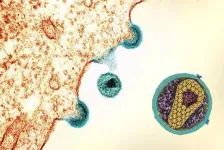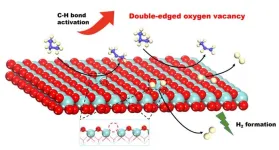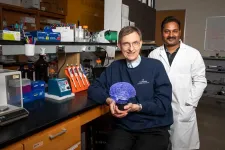Human Immunome Project and Michelson Medical Research Foundation award $150,000 grants to three early-career scientists researching immunology and vaccines
2025-02-19
(Press-News.org) NEW YORK – The Human Immunome Project (HIP) and Michelson Medical Research Foundation (MMRF) have awarded Dr. Omar Abudayyeh (Brigham and Women’s Hospital; Harvard Medical School), Dr. Caleb Lareau (Memorial Sloan Kettering Cancer Center), and Dr. Yuzhong Liu (Scripps Research) the 2024 Michelson Prizes: Next Generation Grants.
The $150,000 research grants are awarded annually to support early-career scientists advancing human immunology, vaccine discovery, and immunotherapy research for major global diseases.
“Investing in bold, early-career scientists fuels the high-risk, high-reward ideas that push the boundaries of medicine and pave the way for lifesaving breakthroughs,” said Dr. Gary K. Michelson, founder and co-chair of Michelson Philanthropies and co-founder and chair of the board of directors of the California Institute of Immunology and Immunotherapy. “Cutting-edge immunology research is transforming the way we prevent and treat disease.”
The three recipients, selected by a distinguished committee of internationally recognized scientists, represent the next generation of innovators in human immunology and vaccine research. Their proposals demonstrated novelty and potential to advance vaccines, immunotherapies, and our understanding of why humans respond differently to the same infection.
“The immune system is the epicenter of human health. The award-winning proposals of Dr. Abudayyeh, Dr. Lareau, and Dr. Liu are poised to impact how we understand infection and combat deadly diseases such as cancer,” said HIP CEO Dr. Hans Keirstead. “The Human Immunome Project is proud to support their innovative research.”
Dr. Abudayyeh, Dr. Lareau, and Dr. Liu are the seventh class of Michelson Prize laureates. They will be honored at a virtual award ceremony in collaboration with the Keystone Symposia to be announced later this year.
Meet the 2024 Michelson Prizes: Next Generation Grants Recipients
Dr. Omar Abudayyeh is an assistant professor at Harvard Medical School, investigator at Brigham and Women’s Hospital and Mass General Brigham’s Gene and Cell Therapy Institute, and faculty member with the Department of Stem Cell and Regenerative Biology at Harvard University. His proposal, “Development of Programmable RNA Sensors for Next-Generation Cancer Immunotherapies,” will leverage mRNA therapies and cell state targeting technologies (RADARS) to achieve mRNA tumor-specific therapies. RADARS enables the targeted expression of genetic payloads based on transcriptional state of tumor cells, reducing the risks of side effects and enhancing treatment efficacy with the potential to revolutionize cancer immunotherapy.
Dr. Caleb Lareau is an assistant member of the Computational and Systems Biology Program at Memorial Sloan Kettering Cancer Center. He leads a hybrid experimental and computational lab focused on studying systems immunology in cancer and infection. With support from the Michelson Prize, Caleb and his team will study the blood virome— the billions of viruses that our immune system interacts with daily. This work will shine light on a basic question: how do humans have vastly different responses to the same infections? To tackle this, Dr. Lareau will study the intersection between variation in viral nucleic acids and genetic variation in the population of hundreds of thousands of individuals by mining petabyte-scale data.
Dr. Yuzhong Liu is an assistant professor in the Department of Chemistry at Scripps Research. She leads a lab that combines natural product chemistry and synthetic biology to advance novel drug discovery. Her award-winning Michelson Prize proposal “Improved Saponin-based Adjuvants for Cancer Vaccines,” seeks to use synthetic biology to elucidate the structure-immunoactivity relationship of natural and new-to-nature glycosides to guide the design of more potent and safer vaccine adjuvant candidates for cancer vaccines.
***
About the Human Immunome Project (HIP): The Human Immunome Project (HIP) is maximizing the potential of advanced immunological data to transform health outcomes for everyone, everywhere. To achieve our mission, we are generating the world’s largest and most diverse immunological dataset and building publicly available AI models of the immune system.
About the Michelson Medical Research Foundation: Founded by Dr. Gary K. Michelson in 1995, the Michelson Medical Research Foundation accelerates solutions to global health challenges by fostering high-risk, high-reward approaches that disrupt the status quo to make innovative ideas a reality. Through convergent collaboration among engineers, scientists, and physicians, the foundation helps rapidly move bold concepts and technologies from the laboratory into clinics and communities around the world. Michelson Medical Research Foundation is a division of Michelson Philanthropies. For more information, visit: www.michelsonmedicalresearch.org.
END
[Attachments] See images for this press release:

ELSE PRESS RELEASES FROM THIS DATE:
2025-02-19
After a year of weather extremes that brought everything from deadly floods to bitter cold, experts at East Tennessee State University have released a detailed analysis of the region’s 2024 weather patterns.
Their findings highlight both record-breaking temperatures and catastrophic storms – underscoring the growing need for preparedness as communities face unpredictable conditions.
The report, published by Tennessee’s Climate Office housed at ETSU, details how Southern Appalachia endured scorching heat and devastating floods, including the tragic September storm linked to ...
2025-02-19
Humans have appreciated the beauty of flowers for centuries. Yet, flowers aren’t just aesthetically pleasing. They also play a crucial role in plant reproduction. In all plants, a well-studied gene with a curious name, Unusual Floral Organs (UFO), orchestrates the flowering process. UFO expression hinges on another complex process called cis-regulation. And this one has remained a “black box” of plant biology research for years.
Now, using CRISPR gene editing, Cold ...
2025-02-19
PHILADELPHIA – Cancer patients spend a lot of time on their care. Meeting with doctors and other members of their health care team, getting labs and other tests, picking up prescriptions, and undergoing treatment all takes time. So does getting to and from each appointment, sitting in the waiting room between each appointment, and so on.
In recent years, cancer researchers have worked to quantify the level of “time toxicity” or time spent commuting to, waiting for, and receiving cancer treatment. Now, for the first time, a pilot study has shown it’s possible to use digital technology to safely ...
2025-02-19
A multi-national, multi-institutional study led by Weill Cornell Medicine investigators found little natural resistance to a new HIV therapy called lenacapavir in a population of patients in Uganda.
The study, published Jan. 30 in the Journal of Antimicrobial Chemotherapy, adds to growing evidence that lenacapavir may be a powerful new tool in the global anti-HIV drug arsenal. Approximately, 1.5 million people are living with HIV in Uganda.
“Our data shows that only 1.6% of the individuals studied are living with HIV ...
2025-02-19
There are currently around 275,000 glaciers worldwide, in which huge quantities of fresh water are stored. But this reservoir is increasingly shrinking. Since the turn of the millennium, glaciers around the world – i.e. ice masses on land excluding the Greenland and Antarctic ice sheets – have lost around 273 billion tonnes of ice per year. This corresponds to about five and a half times the volume of Lake Constance. Overall, the world’s glaciers have lost around five per cent of their total volume since the year 2000. This is the conclusion reached by an international research team of which Tobias Bolch from the Institute of Geodesy ...
2025-02-19
February 19, 2025-- Breast cancer incidence trends in U.S. women under 40 vary by geography and supports incorporating location information with established risk factors into risk prediction, improving the ability to identify groups of younger women at higher risk for early-onset breast cancer, according to a new study at Columbia University Mailman School of Public Health. This study comprehensively examined trends across different states, regions, metropolitan versus non-metropolitan areas and by racial and ethnic groups. It also is one of the first to incorporate ...
2025-02-19
A three-year effort to encourage California prosecutors to reconsider the sentences given to some people in state prison has resulted in a modest number of people being resentenced, but improvements are needed to speed review of more cases, according to a new RAND report.
During the project involving nine counties, more than 1,100 cases received an initial review. After comprehensive reviews by county district attorneys for the suitability for resentencing, 227 individuals eventually received new sentences and 174 of those offenders had been released ...
2025-02-19
Propane dehydrogenation (PDH), as an efficient catalytic production process to obtain propylene, has developed rapidly in recent years. Previous studies have shown that zirconia exhibited excellent performance in the PDH, with the coordination-unsaturated zirconium (Zrcus) around the oxygen vacancy being the active site in the reaction. However, the critical role of oxygen vacancy is still remaining elusive, and lacked a rationale to establish a relation between structure and performance. Moreover, the strong binding of propene and hydrogen molecules shadowed ...
2025-02-19
CHAMPAIGN, Ill. — A genetic mutation found in two human patients with schizophrenia also increased schizophrenia-related behaviors in mice with the same mutation, a rare finding of a direct genetic link to psychosis, report researchers at the University of Illinois Urbana-Champaign and colleagues in Massachusetts and Germany.
The mutation increases levels of glycine decarboxylase, or GLDC, an enzyme responsible for regulating glycine in the brain. Glycine activates receptors for the neurotransmitter glutamate, called NDMA receptors.
“The genetics of schizophrenia is very complex, and it ...
2025-02-19
Humanity can farm more food from the seas to help feed the planet while shrinking mariculture's negative impacts on biodiversity, according to new research led by the University of Michigan.
There is a catch, though: We need to be strategic about it.
"We can achieve this sustainable mariculture development," said Deqiang Ma, who led the study as a postdoctoral researcher at the U-M School for Environment and Sustainability. "With strategic planning, we can achieve the goal of conserving marine species while meeting the global demand for the ...
LAST 30 PRESS RELEASES:
[Press-News.org] Human Immunome Project and Michelson Medical Research Foundation award $150,000 grants to three early-career scientists researching immunology and vaccines






